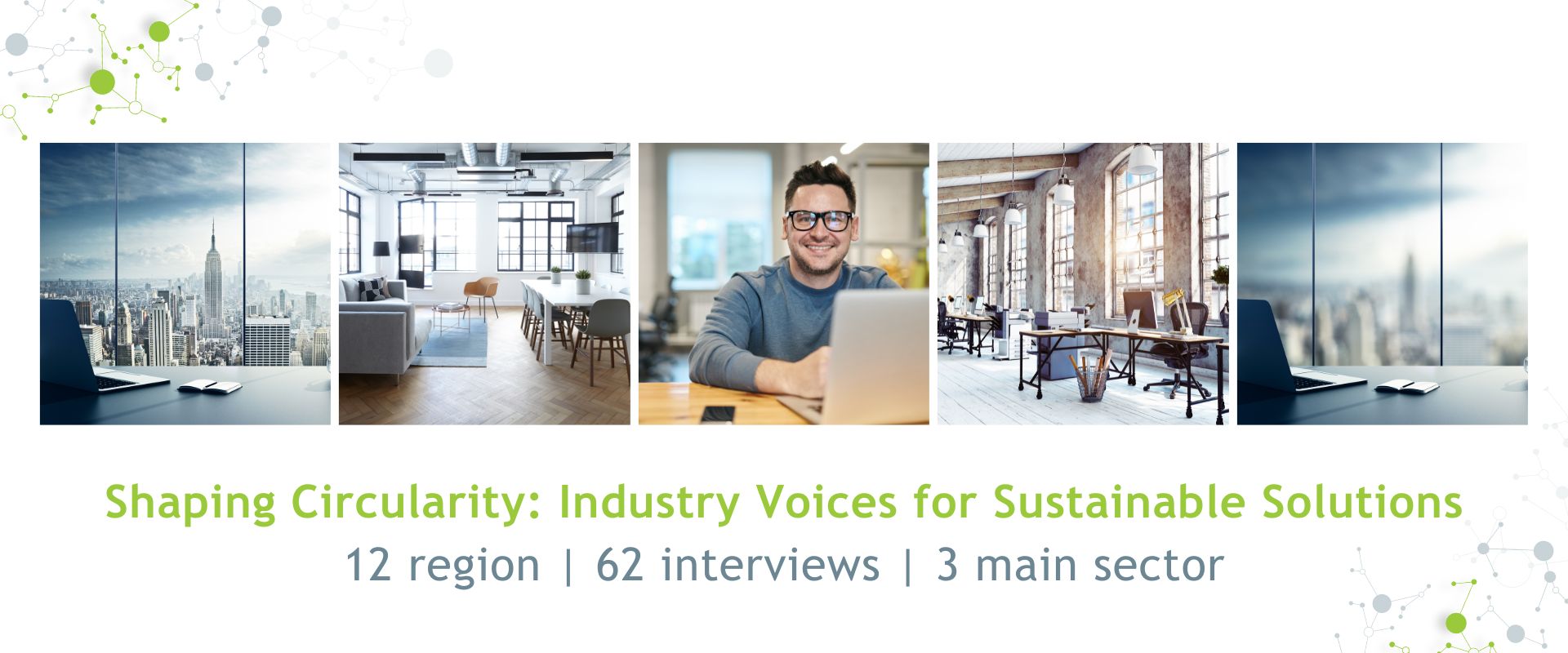The SMART CIRCUIT project, as part of the Interreg CENTRAL EUROPE program, conducted an extensive series of interviews involving 62 enterprises across nine countries, aiming to assess and support the transition towards a circular economy within the Central European manufacturing sector. This initiative covered key sectors including textiles, construction, ICT/electronics, and other industries, revealing critical insights into the current state, challenges, opportunities, and future directions for circular economy adoption.
Overall conclusions
The findings underscore a substantial momentum towards embracing circular economy principles, with 74% of interviewed companies having an official circular strategy in place . However, the journey is not without its challenges. Regulatory changes, compliance, unstable market dynamics, and technological obsolescence are cited as significant hurdles. Despite these obstacles, companies are optimistic about the potential for resource efficiency, market growth, and innovation through circular practices.
The integration of digital technologies is seen as a pivotal enabler for circular transitions, offering opportunities for enhancing resource management, reducing waste, and fostering innovations. Nevertheless, a strategic, well-rounded approach incorporating technology, collaboration, and regulatory compliance emerges as essential for realizing the full potential of circular economy practices.
Sector-specific insights
1. TEXTILE SECTOR
Companies in the textile sector pinpoint regulatory compliance and economic challenges as their predominant hurdles. Yet, market expansion and customer acquisition are viewed as the prime opportunities within their circular transition journey. The sector calls for stronger regulations, tax incentives for reuse, and more robust waste management frameworks to support their shift towards sustainability.
- Challenges: Regulatory compliance and economic challenges top the list for textile companies, with 80% identifying regulatory changes as a significant hurdle. Economic pressures also loom large, affecting 70% of companies.
- Opportunities: Market expansion and customer acquisition are seen as crucial, with 70% of companies highlighting these areas. The sector also shows a strong inclination towards innovations and sustainable value creation, with these areas marked as significant by a substantial portion of respondents.
- Regulatory Needs: The textile sector must align with the Green Claims Directive adopted in 2023, which mandates transparent and substantiated environmental claims, ensuring all marketing communications accurately reflect a product’s ecological impact. Additionally, the upcoming Mandatory Textile Collection regulation, set for adoption in 2025, will require companies to facilitate the collection and recycling of textiles, further emphasizing the industry’s shift towards sustainable practices.
2. CONSTRUCTION SECTOR
The construction industry faces significant challenges related to customer and market readiness, financial hurdles, and technology integration. Resource efficiency, circular design practices, and new business models are identified as key opportunities to drive the sector towards circularity. Specific regulatory initiatives are needed to address energy use, fire safety, and the adoption of sustainable construction practices.
- Challenges: Over 60% of companies face obstacles related to customer and market readiness, financial hurdles, and technology integration. Regulatory standards and challenges also pose significant barriers, impacting 50% of businesses.
- Opportunities: Resource efficiency is identified as a primary opportunity by 60% of companies, followed closely by the benefits of circular design and practices (50%). Integration of advanced technologies is seen as beneficial by 40% of companies.
- Regulatory Needs: Specific calls for energy use regulations, norms regarding fire safety and acoustics, and a concrete certification only – EN 206 highlight the sector’s demand for supportive regulatory frameworks.
3. ICT/ELECTRONICS SECTOR
In the ICT/electronics sector, cost management, technological innovation, and market dynamics present major challenges. However, over half of the companies identify resource efficiency and management as a primary opportunity, followed closely by customer awareness and market expansion. Regulatory support, such as the GDPR, Right-to-repair legislation, and WEEE Directive, is crucial for facilitating this transition.
- Challenges: Cost management and initial investment concerns dominate, affecting 65% of companies. Technological innovation and integration challenges are next, cited by 59% of respondents.
- Opportunities: A significant 53% of companies see resource efficiency and management as the main opportunity. This is closely followed by customer awareness and market expansion (47%) and waste reduction (41%).
- Regulatory Needs: Key regulatory initiatives include GDPR, Right-to-repair legislation, and the WEEE Directive, underscoring the sector’s need for clear, supportive regulatory environments.
The road ahead
The insights from the SMART CIRCUIT industry interviews illuminate the varied landscape of circular economy adoption across sectors in Central Europe. As companies navigate through challenges and leverage opportunities, the role of digital technologies, innovative business models, and supportive regulatory frameworks becomes increasingly evident.
To drive forward the circular economy agenda, a collaborative approach involving industry stakeholders, policymakers, and technology providers is essential. By harnessing the power of digital innovations and embracing a holistic circular strategy, the manufacturing sector can make significant strides towards sustainability, competitiveness, and resilience.
